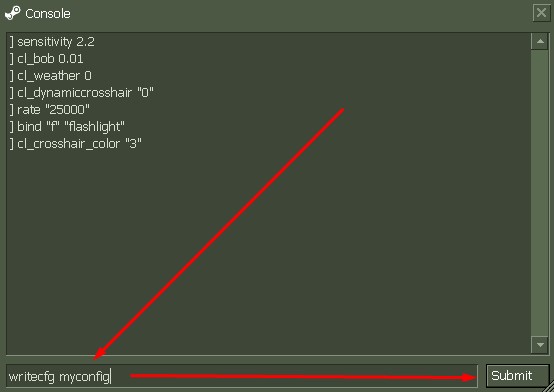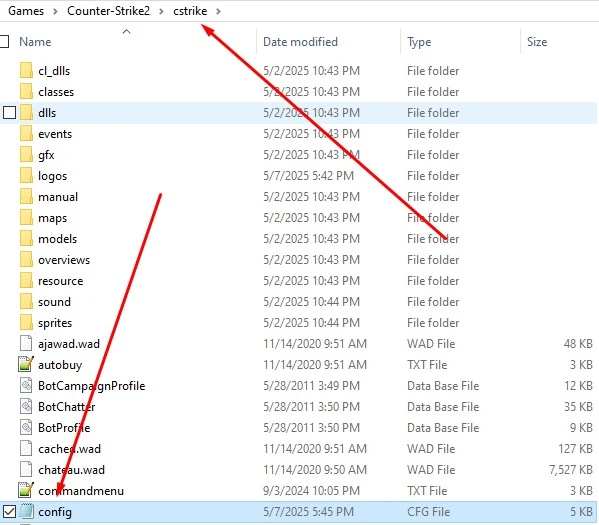How to save config in cs 1.6 using console or config file
Last updated: May 7, 2025
Need help installing?
How to save config in cs 1.6 (Counter-Strike 1.6)
If you’ve customized your Counter-Strike 1.6 settings — such as sensitivity, crosshair, key binds, or resolution — and lost them after restarting the game, you’re not alone. Many players face this frustrating issue, especially after updates or fresh installs. That’s why it’s essential to learn how to save config in cs 1.6 to maintain your optimal setup every time you launch the game.
Saving your cs 1.6 config ensures that your personal preferences are always applied. Whether it’s mouse sensitivity, video resolution, crosshair style, sound volumes, or key binds, having a saved configuration makes your gameplay consistent and enjoyable. Once you’ve fine-tuned your settings for competitive play or casual fun, you don’t want to reset everything each time. This guide will walk you through various ways to save your config file in counter-strike 1.6 using console commands, manual file editing, and auto-execution methods. It covers both Steam and Non-Steam versions.
Method 1: Save Config in CS 1.6 Using Console Commands
The easiest and most reliable way to save your current CS 1.6 settings is by using the writecfg command via the developer console. This allows you to create custom configuration files with your preferred settings and load them whenever needed.
- Open CS 1.6 and set up your preferred settings — sensitivity, binds, resolution, crosshair, etc.
- Press the
~key to open the developer console. - Type in your custom commands, for example:
sensitivity "2.3"bind "mouse1" "+attack"cl_crosshair_color "3"
- To save all your current settings to a custom config file, use:
writecfg myconfig
![]()
(You can use any filename instead of myconfig — for example: prosetup, sniper, cfg2025, or any other name you prefer.)
- This will create a file named
myconfig.cfg(or your chosen name) in yourcstrikefolder with all your current settings saved. - When you want to load your saved settings, simply use the
execcommand followed by the filename:exec myconfig.cfg
Next time you make changes, just use the same writecfg command with the same filename to overwrite and update your config. This ensures your personal settings are always up to date.
Why Create Multiple Config Files?
With this method, you can easily create and save different configuration files for various playstyles or scenarios by using unique filenames. For example:
writecfg awp— for an AWP/sniper-specific setupwritecfg practice— for training or practicing settingswritecfg competitive— for competitive matches
You can load any of these saved configurations at any time using the exec command followed by the file name:
exec awp.cfgexec practice.cfgexec competitive.cfg
This way, you can easily switch between different configs depending on your needs without losing any of your custom settings.
Method 2: Manual Editing of Config Files
If you want more control or prefer to edit everything in one place, manual file editing is the way to go. You can batch multiple settings together and avoid doing it in-game every time.
- Navigate to your CS 1.6 installation folder:
- Steam:
C:\Program Files (x86)\Steam\steamapps\common\Half-Life\cstrike\ - Non-Steam:
C:\Games\Counter-Strike 1.6\cstrike\
- Steam:
- Open the
config.cfgfile using Notepad or another text editor (like Notepad++ or VS Code for better visibility). - Find, change, or add the lines you want. Examples:
sensitivity "2.5"– mouse sensitivitybind "mouse1" "+attack"– fire weapon with left mouse buttoncl_crosshair_size "small"– adjust crosshairvolume "0.7"– game volume
- After editing, save the file. Do not change the file extension or encoding.
- Restart CS 1.6 to apply the settings. The game will automatically read from this file on startup.
- Tip: Keep a backup of your config.cfg in case you reinstall or share it with friends.
Method 3: Auto-Load Config Using Launch Commands (Steam Only)
This method allows you to load a custom config every time you start the game, automatically — no need to type anything manually.
- Open Steam and go to your Library.
- Right-click on Counter-Strike 1.6 and select Properties.
- Click on Set Launch Options.
- Add this line:
+exec autoexec.cfg - This command tells CS 1.6 to execute a file named
autoexec.cfgat every startup. - Place your
autoexec.cfgfile in the same directory asconfig.cfg(cstrikefolder). - Include all your personal commands in that file. Example:
cl_dynamiccrosshair "0"rate "25000"bind "f" "flashlight"
- This method is best for competitive players or those who reinstall often and want auto-settings.
Steam vs Non-Steam: Where to Save Your CS 1.6 Config
Although both versions of the game function similarly, the directory path where config files are stored is different:
- Steam:
C:\Program Files (x86)\Steam\steamapps\common\Half-Life\cstrike\ - Non-Steam:
C:\Games\Counter-Strike 1.6\cstrike\
In both cases:
- Saving changes in
config.cfgwill apply on next game launch. - You can also maintain multiple configs like
sniper.cfg,awp.cfg, orpractice.cfgand load them usingexeccommand anytime.
Final Tips on Saving Configs in CS 1.6
writecfgsaves your current in-game settings to the default config file.host_writeconfig myconfiglets you save to a specific file name.exec myconfig.cfgloads your saved config anytime — even in-game.- Manual editing of
config.cfggives full control and lets you tweak advanced commands. +exec autoexec.cfgin Steam launch options lets your config auto-load on startup.- Keep a backup of your .cfg files to avoid losing settings after reinstall or game updates.
Saving your Counter-Strike 1.6 config not only saves time but ensures every match feels just right. You’ll never again need to reset your crosshair or rebind keys after restarting. Whether you’re a competitive player or just playing for nostalgia, keeping your config safe is a must.
Ready to jump in? Download CS 1.6, apply your settings, and save your config today for a better, faster, and frustration-free gaming experience!


